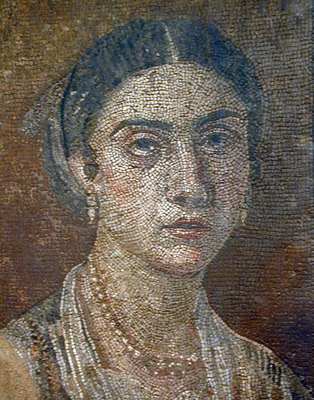 Portrait of an elite woman, mosaic
Portrait of an elite woman, mosaic Pompeii, 1st century CE
 Portrait of an elite woman, mosaic
Portrait of an elite woman, mosaic Terentia was born in the last century of the Republic (c.98 BCE) into one of the branches of the gens Terentia, a plebeian noble family dating from early Republican Rome (see naming citizen women). No mention survives of her parents, but she had a half-sister named Fabia (80-58 BCE), daughter of the ancient patrician gens Fabia. Terentia would have been educated for marriage in the upper classes, while Fabia was enrolled in the Vestal priesthood. Given the size of Terentia's dowry, her family was wealthy: when she married in c.80 BCE at the age of eighteen, she brought Cicero (106-43 BCE) 100,000 denarii (Plutarch, Cicero 8.3; its equivalent in sesterces was the property qualification for Senate which he entered in 74 BCE). In her own right, probably because she married sine manu (see manus marriage), Terentia retained other wealth that did not transfer to her husband. Traditionally as materfamilias, the household was Terentia's domain (see World of Family): she bore and educated their two children, Tullia (79/8-45 BCE) and Cicero Minor (65-27 BCE); she was an active supporter of Cicero's move up the cursus honorum as quaestor, aedile, praetor, consul, proconsul (76-47 BCE); she maintained their extensive homes, staff and finances. In early December 63 BCE, as wife of the consul she hosted the religious festival of the Bona Dea, a secret all-female holiday overseen by the Vestals in her home on the Palatine; there, encouraged by the Vestals, she reported a sign to Cicero that convinced him to order the death of the Catilinarian conspirators (see Plutarch, Cicero 19-20). Terentia's family life was disgraced and endangered by Cicero's political enemies, notably during his exile (May 58-September 57 BCE), when their four villas were sacked and burned. In 50 BCE she arranged Tullia's third marriage, to Dolabella, while Cicero was proconsul in Cilicia. Terentia sheltered with pregnant Tullia in their home on the Palatine in Rome in 49 BCE while Cicero fled to Greece in support of Pompey. Their marriage strained by the civil war, separations and disagreement, Cicero divorced Terentia in 47/46 BCE after 30+ years of marriage (see Divortium, Claassen). The final reference to her in the sources is that she lived to 103 years (Pliny the Elder, Nat Hist 7.158, Valerius Maximus Fact.Dict. Mem. 8.13.6). Other well-known elite matronae with whom she associated were: Hortensia; Clodia Metelli; Fulvia; Junia Tertia; Servilia. For more about Roman marriage and wedding ceremonies, see Matrimonium; about the role of the matrona in the household, see Class, State, Religion and Women's Role in Family Religion; about Terentia, see Boatwright (211), Brennan (2012), Jeppesen-Wigelsworth (2013), Osgood (2024), Richlin in Lateiner (2013), Treggiari (2007) in the Bibliography.
[1] Noli putare me ad quemquam longiores epistulas scribere, nisi si quis ad me plura scripsit, cui puto rescribi oportere; nec enim habeo quod scribam, nec hoc tempore quidquam difficilius facio. Ad te vero et ad nostram Tulliolam non queo sine plurimis lacrimis scribere; vos enim video esse miserrimas, quas ego beatissimas semper esse volui idque praestare debui et, nisi tam timidi fuissemus, praestitissem. [ . . .]
[2] A te quidem omnia fieri fortissime et amantissime video, nec miror, sed maereo casum eiusmodi, ut tantis tuis miseriis meae miseriae subleventur: nam ad me P[ublius] Valerius, ![]() homo officiosus, scripsit id quod ego maximo cum fletu legi, quemadmodum a Vestae ad tabulam Valeriam ducta esses. Hem, mea lux, meum desiderium, unde omnes opem petere solebant! te nunc, mea Terentia, sic vexari, sic iacere in lacrimis et sordibus, idque fieri mea culpa, qui ceteros servavi, ut nos periremus!
homo officiosus, scripsit id quod ego maximo cum fletu legi, quemadmodum a Vestae ad tabulam Valeriam ducta esses. Hem, mea lux, meum desiderium, unde omnes opem petere solebant! te nunc, mea Terentia, sic vexari, sic iacere in lacrimis et sordibus, idque fieri mea culpa, qui ceteros servavi, ut nos periremus!
[3] Quod de domo scribis, hoc est de area, ego vero tum denique mihi videbor restitutus, si illa nobis erit restituta; verum haec non sunt in nostra manu: illud doleo, quae impensa facienda est, in eius partem te miseram et despoliatam venire. Quod si conficitur negotium, omnia consequemur; sin eadem nos fortuna premet, etiamne reliquias tuas misera proiicies? Obsecro te, mea vita, quod ad sumptum attinet, sine alios, qui possunt, si modo volunt, sustinere, et valetudinem istam infirmam si me amas noli vexare; nam mihi ante oculos dies noctesque versaris: omnes labores te excipere video; timeo ut sustineas. Sed video in te esse omnia; quare, ut id quod speras et quod agis consequamur, servi valetudini.
[4] Ego ad quos scribam nescio, nisi ad eos qui ad me scribunt, aut [ad eos] de quibus ad me vos aliquid scribitis. Longius, quoniam ita vobis placet, non discedam; sed velim quam saepissime litteras mittatis, praesertim si quid est firmius quod speremus.
Valete, mea desideria, valete, D[edi]. a[nte]. d[iem]. III. Non[as]. Oct[obris]. Thessalonica.
Click on the underlined words for translation aids and commentary, which will appear in a small window. Click on the icon link![]() to the right of the line for related images and information.
to the right of the line for related images and information.